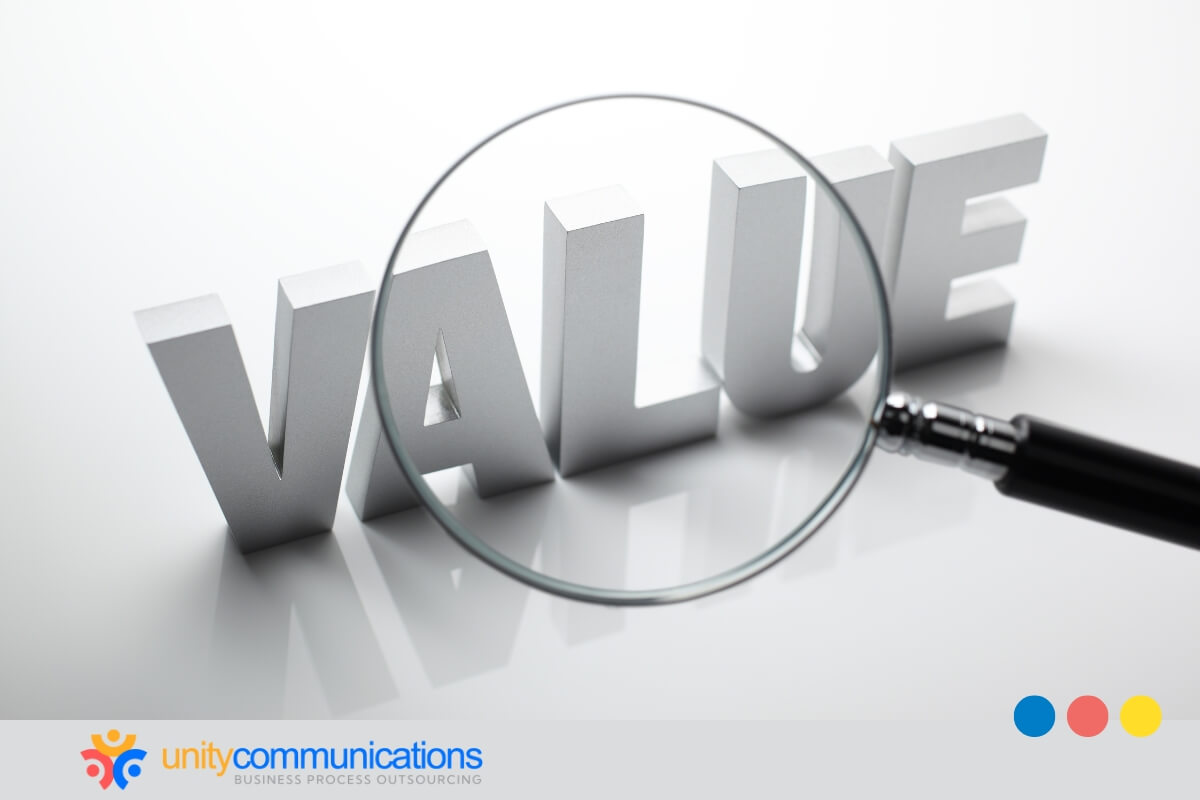Table of Contents
Unlike business process outsourcing (BPO), which focuses on repetitive, rule-based work such as data entry or customer service, knowledge process outsourcing (KPO) involves complex, specialized roles such as legal research and market intelligence.
The responsibility is higher, and so are the stakes, requiring a thoughtful, informed selection process. You need a provider that understands your niche, aligns with your goals, and contributes real strategic value.
This article reveals the most essential criteria for selecting a KPO service provider, helping to avoid mismatches and find someone who drives insight, innovation, and sustainable growth.
KPO vs. BPO: Key differences that impact your selection

The global KPO market could reach $374.3 billion by 2030 as more companies need specialized expertise and knowledge. But what is KPO, and how does it differ from BPO?
Let’s first discuss what BPO is. Business process outsourcing involves delegating routine, transactional roles to third-party providers. Examples include data entry, payroll processing, and customer service. Companies hire BPO firms to lower operating and labor costs, enhance efficiency and productivity, and free internal teams to focus on core competencies.
However, as markets, industries, and technologies change, processes have become more complex and technical. For example, globalization allows businesses to expand their markets and raises compliance risks.
To help them navigate and adapt to these changes, companies opt for KPO. It is outsourcing more complicated, data- and tech-driven roles to external providers to access deep expertise, critical thinking, and advanced technology. Key differences between BPO and KPO:
- Purpose: BPO optimizes operational efficiency; KPO provides a strategic competitive advantage.
- Complexity: BPO handles routine tasks; KPO manages complex, analytical work.
- Success metrics: BPO measures efficiency; KPO measures impact and accuracy.
- Value creation: BPO reduces costs; KPO drives innovation and strategic insights.
In other words, with KPO, you are not merely outsourcing tasks. You’re adding strategic horsepower to your team that can significantly influence the bottom line and growth. For this reason, selecting a KPO service provider means choosing a long-term partner that can shape your decisions, scale intelligently, and help you remain competitive and relevant.
6 top qualifications to look for in a reliable KPO partner
When selecting a KPO service provider, look beyond the sales pitch. A reliable provider should check the technical boxes and demonstrate strategic alignment and long-term potential. Here are the primary qualifications to evaluate:
1. Proven industry experience
Pick a provider with a solid track record in your industry or vertical. Ask for case studies or client references to determine their ability to deliver results.
2. Specialized domain expertise
Choose third-party teams with subject-matter experts, not just generalists. KPO work often requires a nuanced understanding of legal terminology, medical data, or financial modeling.
3. Relevant certifications and compliance
Look for recognized standards such as ISO 9001 (quality management), ISO/IEC 27001 (information security), and industry-specific compliance (HIPAA, GDPR). These signal a mature, secure, and compliant operation.
4. Robust hiring and training processes
Evaluate how the provider sources and trains talent. Do they continuously upskill their analysts, researchers, or consultants to match your industry’s evolving demands?
5. Technology integration and infrastructure
An excellent KPO partner invests in modern tools, such as artificial intelligence (AI), machine learning, and proprietary platforms, to increase efficiency, accuracy, and insight delivery.
6. Scalability and adaptability
You need a partner who can grow with you. Ask about their capacity to expand teams, take on more complex projects, and adapt to changing workflows or volumes.
When choosing a KPO firm, prioritize depth over hype. Partner with a provider that brings capability, clarity, commitment, and the capacity to grow with your business.
Security and infrastructure checklist for KPO providers

You must be critical when selecting a KPO service provider because you are not only outsourcing expertise. You entrust them with sensitive data, such as customer records, financial reports, and intellectual property (IP). A wrong choice can increase your risk of data breaches, non-compliance, and reputational damage.
Develop a secure, compliant KPO relationship by assessing the provider’s technical infrastructure and data management. Here’s what to look for:
Encryption and access controls
Determine whether the provider uses enterprise-grade encryption (AES-256) when transmitting data and implements strict access controls, such as multi-factor authentication and role-based permissions.
Cloud infrastructure and backups
Ask about their cloud platform (AWS, Azure) and backup protocols. They should offer automatic, frequent backups and a clear disaster recovery plan with defined recovery time objectives (RTOs).
Regulatory compliance
Confirm that the provider complies with relevant data laws, such as the General Data Protection Regulation (GDPR), the Health Insurance Portability and Accountability Act of 1996 (HIPAA), and the Data Privacy Act of 2012 in the Philippines.
Analytics and system integration
Choose a provider that uses scalable, modern analytics tools, such as Power BI or Tableau, and platforms that can integrate with your systems for seamless reporting and workflow management.
Employee policies and security audits
Check if the company regularly trains its teams in data handling and confidentiality. Look for third-party certifications such as ISO/IEC 27001 or SOC 2 to ensure they meet global security standards.
Strong infrastructure and security practices are non-negotiable. They form the backbone of a trustworthy KPO partnership that protects data and complies with regulations.
Must-ask questions when evaluating KPO providers
Besides examining their portfolios, case studies, and track records, you can also ask questions to filter your options. Their responses can reveal how transparent, experienced, and aligned they are with your business needs. Key questions to ask:
- How do you onboard new clients, especially in highly regulated industries? This informs whether they have structured, compliant processes for handling sensitive data and complex requirements.
- What does your standard service-level agreement (SLA) include? The role of SLA in effective outsourcing is crucial in setting expectations. Ask about delivery timelines, quality metrics, revision policies, and escalation procedures.
- How do you manage changes in scope or shifting priorities? Flexibility is key. You want a partner who can adapt and has a transparent, fair process for handling changes mid-project.
- Can I speak with a current or past client in a similar industry? Real-world feedback provides insights into their reliability, communication style, and capability.
Don’t rely on the proposal alone. When reviewing responses to your request for proposal (RFP) or during discovery calls, ask questions that go beyond surface-level promises to gauge how a provider truly operates.
How to use trial projects to test KPO providers

A key part of selecting a KPO service provider is testing how they work before making a long-term commitment. A trial project lets you evaluate their performance in a real-world scenario without taking on too much risk.
Start with a small scope, such as a single process, market, or deliverable. This lets you see how well they communicate, how fast they handle issues, and how reliable their work is.
Use this opportunity to assess their ability to follow instructions, meet deadlines, and adapt to feedback. A provider who excels in a controlled trial is more likely to succeed at scale.
You can also roll out services gradually through phased onboarding. Begin with one department or function, then expand based on results. This step-by-step approach helps build trust, reduce friction, and ensure both teams align before scaling further.
Red flags that signal the wrong KPO provider
A 2023 Clutch report found that 83% of small businesses planned to maintain or increase their outsourcing spend. This trend highlights the growing reliance on external providers and, with it, greater risks.
Choosing the right partner from the start is crucial, as the cost of a poor outsourcing decision is expensive. Watch for these red flags when evaluating KPO providers:
- Vague pricing or hidden fees
- Reluctance to provide client references
- Overpromising capabilities without case studies to support them
- Poor communication during initial discussions
- Inflexibility on trial projects or SLAs
A trustworthy KPO provider should be open, flexible, and willing to demonstrate its value through transparent pricing, references, and pilot projects. Anything less is a signal to keep looking.
The bottom line
When selecting a KPO service provider, don’t just tick the boxes. Find a team that fits your business, speaks your language, and shares your goals.
Take your time, ask the right questions, and run a trial. You will know you have found the right fit when a provider can deliver expertise, innovation, and accountability.
Are you ready to explore your ideal KPO match? Let’s connect today to find a partner that delivers results, not just promises.




